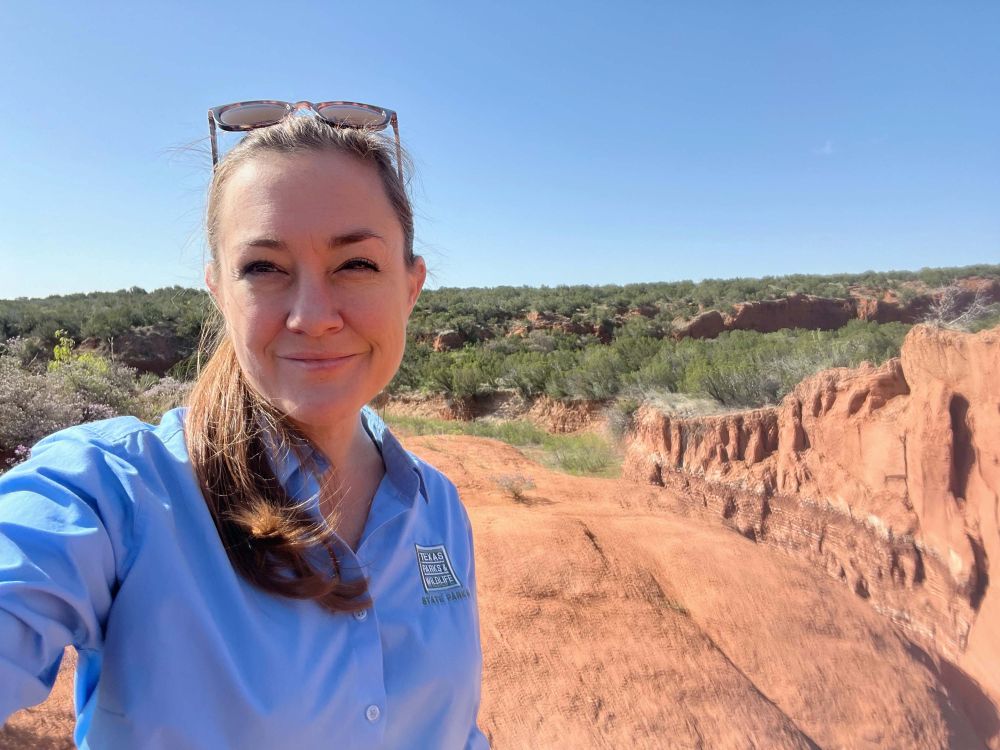Marinda Griffin

Class of 2017, M.S. in Applied Geography
Discovering Direction Through Geography
Marinda Griffin is a proud two-time graduate of the University of North Texas, where she earned both her Bachelor’s and Master’s degrees in Geography along with a minor in Anthropology. Her passion for cultural and environmental geography earned her the Terry Jordan Award for Cultural Geography in 2017, recognizing her academic excellence and curiosity about the human-environment connection.
Marinda was drawn to the geography program because of its interdisciplinary flexibility. “I wasn’t entirely sure what I wanted to pursue as a career,” she explained. “But the program offered such a diverse array of classes that it gave me room to explore and find my path.”
From Fieldwork to Research
As an undergraduate, Marinda gained hands-on experience through multiple internships. She worked with the California Coastal Commission investigating permit violations, participated in aquatic habitat restoration with the U.S. Army Corps of Engineers at the Lewisville Aquatic Ecosystem Research Facility (LAERF), and interned with the North Central Texas Council of Governments.
After earning her bachelor’s degree, she became a Research Associate at UNT’s Center for Economic Development and Research, where she led a small research team and contributed to both local and national economic impact studies.
In graduate school, Marinda developed close mentorships with Dr. Waquar Ahmed and Dr. Ipsita Chatterjee, serving as a teaching assistant for their courses in Urban Geography and Critical Resource Geography. She credits them with shaping her intellectual growth. “Waquar taught me to never accept ‘good enough,’ and I still remember something Ipsita told me that I use in my job to this day: ‘Even when you don’t know what to write, just write something, you can always revise it later.’”
Her thesis, guided by Dr. Andrew Nelson, focused on place-making in community agriculture programs among Bhutanese refugees. The project reflected her interest in how people create meaning and belonging through engagement with nature and place. She also appreciated the chance to take courses outside her discipline, such as Environmental Anthropology and Feminist Theory, and credits Dr. Paul Hudak, her undergraduate advisor, for guiding her early academic journey.
Planning for Texas Parks and Public Health
Today, Marinda serves as a Planner III with the Texas Parks and Wildlife Department (TPWD), overseeing Regions 5 and 6, which together include 34 state parks. Her work involves advanced planning at both the regional and statewide levels, including developing public use plans, conducting land-use and GIS-based analysis, and coordinating with interdisciplinary teams across Natural and Cultural Resources, Maintenance Programs, and the Infrastructure Division.
She was instrumental in the rollout of the Texas Healthy Parks Plan, helping implement the program, lead training, and present on the initiative statewide. Developed by Texas Health and Human Services and the Trust for Public Land, the plan emerged in response to the COVID-19 pandemic’s surge in park usage and focuses on using parks as tools for public health and community resilience. Marinda helped support the creation of a Decision Support Tool that identifies vulnerable areas based on chronic health conditions, lack of park access, and exposure to urban heat and pollution.
Designing for Health and Resilience
Before joining TPWD, Marinda worked as an Urban Design Associate with the Texas Trees Foundation in Dallas. There, she contributed to the award-winning Southwestern Medical District Streetscape and Park, a ten-acre project that reimagined one of the city’s hottest urban heat islands into a space promoting healing and wellness. The project applied biophilic design strategies such as sensory gardens and shaded green corridors and earned recognition from the American Planning Association for its community engagement efforts, which Marinda led.
Her first job after graduate school was as Head of Research for Trademark Property Company in Fort Worth, where she applied GIS and demographic analysis to mixed-use development and retail rebranding projects nationwide. She also mentored a team of interns, teaching them how thoughtful spatial design and place-making can transform how people experience public spaces.
A Lifelong Passion for People and Place
Marinda’s professional and personal work share a common thread: the connection between nature and human well-being. Her graduate research explored how access to nature impacts those who have experienced displacement or isolation, and that passion continues to guide her today. She has interviewed Bill Browning, co-author of The Economics of Biophilia, and often draws on his and E.O. Wilson’s work to understand how natural elements improve cognitive performance, reduce stress, and foster resilience.
When asked what advice she would give to current students, Marinda said, “Don’t feel bad if it takes you a while to figure things out. I truly believe in the saying, shortened from a Ralph Waldo Emerson quote: ‘It’s about the journey, not the destination.’”
Beyond the Office
Marinda still finds joy in small discoveries. “Finding the human thumb in a jar in the herbarium in the environmental science building,” she recalled with a laugh. “I assume it was found in an animal, and probably used as the white elephant gift for the faculty Christmas party.”
Outside of work, she enjoys introducing her toddler to earth science and the ways built environments influence nature. The first book she bought him was My First 100 Engineering Words. She has also returned to painting, using the concept of biophilia as the foundation for her next art series.
If she could return to UNT for one more class, she would explore 3D modeling, design, or civil engineering, subjects that complement her planning work today.
From her first geography classes in Denton to shaping park policy for the entire state, Marinda Griffin exemplifies the creativity, compassion, and curiosity that define UNT Geography alumni. Her work continues to bridge art, science, and community, reminding us all that our environment shapes us just as much as we shape it.